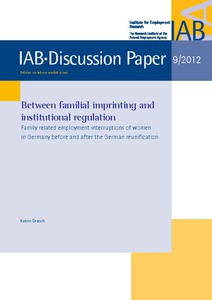Between familial imprinting and institutional regulation: family related employment interruptions of women in Germany before and after the German reunification
"In this paper, I examine how family related employment interruptions for women in the FRG (Federal Republic of Germany) and the GDR (German Democratic Republic) looked like in the period prior to German reunification. Furthermore, I investigate how career interruptions developed after the Germ...
| Main Author: | |
|---|---|
| Institution: | ETUI-European Trade Union Institute |
| Format: | TEXT |
| Language: | English |
| Published: |
Nürnberg
2012
IAB |
| Subjects: | |
| Online Access: | https://www.labourline.org/KENTIKA-19134331124919525139-Between-familial-imprinting-an.htm |
| Summary: | "In this paper, I examine how family related employment interruptions for women in the FRG (Federal Republic of Germany) and the GDR (German Democratic Republic) looked like in the period prior to German reunification. Furthermore, I investigate how career interruptions developed after the German reunification in the old and new states and whether a convergence of re-entry behaviour can be observed. Following research questions are addressed: Which factors are more important: attitudes towards the employment of mothers, which were transferred through socialisation in childhood and adolescence, or institutional arrangements shaped by parental leave regulations? Based on data from the IAB ALWA study ('Working and Learning in a Changing World'), the results show that even twenty years after the German reunification, significant differences between women in East and West Germany are found to exist with respect to family related employment interruptions. These interruptions are subject to strong institutional control. Women who were raised in the GDR and moved to one of the old federal states after the reunification do not behave differently than West German women. This result suggests that institutional arrangements including for example also childcare availability are more important for re-entry behaviour than socialisation. However, the results must be interpreted carefully: it could be that the willingness to move of East German women is also influenced by socialisation." |
|---|---|
| Physical Description: | 34 p. Digital |

